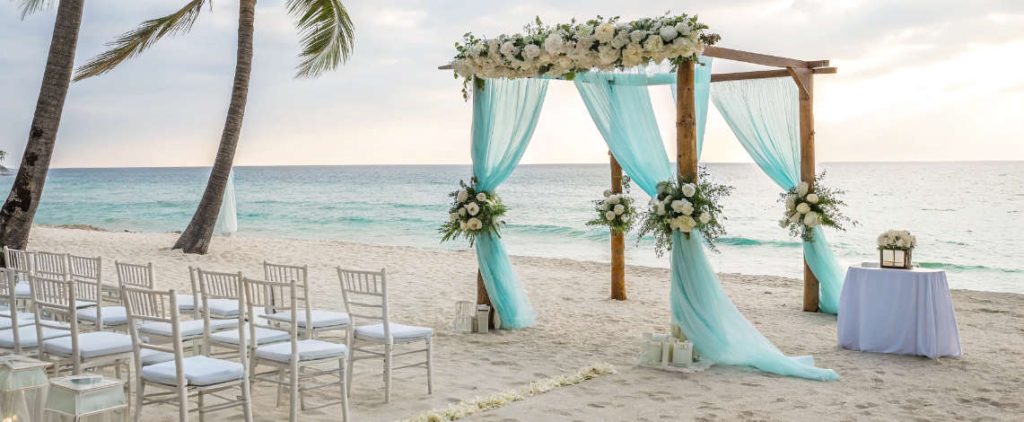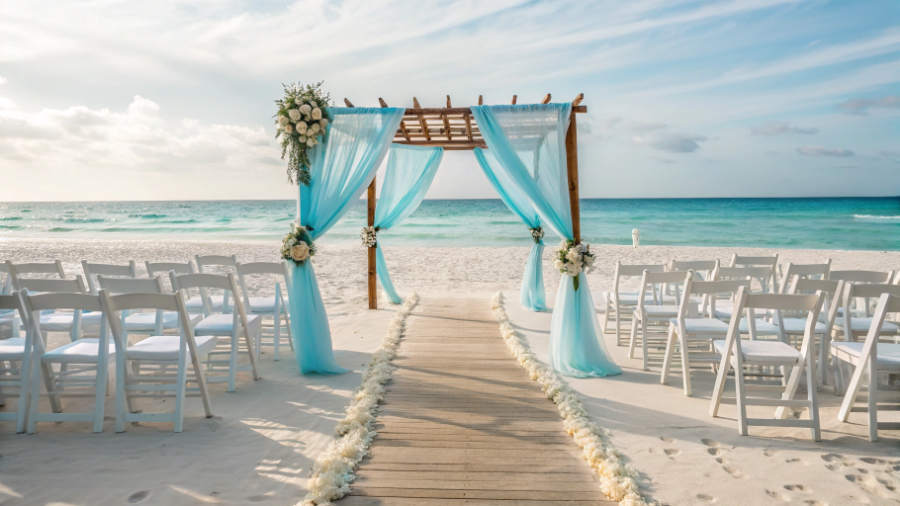Planning a beach wedding sounds like a dream, doesn’t it? The soft sand, the soothing sound of waves, and the golden glow of a coastal sunset—it’s pure romance.
But here’s the thing: beach weddings come with their own unique challenges, and if you’re not prepared, your perfect day might have a few surprises.
Don’t worry, though! By the time you finish this article, you’ll know exactly what to expect and how to handle it.
Key Takeaways
- Always research beach permits, regulations, and tide schedules ahead of time.
- Keep your guests’ comfort in mind with shaded seating, water, and thoughtful extras like sunscreen.
- Hire experienced vendors who specialize in outdoor events to make your day stress-free.
- Always have a backup plan for unpredictable weather.
1. Pick the Perfect Beach
Not all beaches are created equal. Some are bustling with crowds, while others offer privacy and tranquility. If you’re dreaming of a peaceful ceremony, look for secluded spots like Sand Key Beach or St. George Island. Just remember to consider guest accessibility and proximity to accommodations.
Beaches that are off the beaten path may give you more control over the ambiance, but they might require extra planning to ensure your guests are comfortable. Looking for inspiration?
A Beautiful Wedding in Florida’s Sand Key Wedding Officiant services can help you choose the ideal spot for your big day.
2. Get Those Permits in Order
Think a beach is free for all? Not exactly. Many popular beaches, like Clearwater Beach, require permits for ceremonies, especially if you’re setting up decor or hosting a large group.
Permits ensure your space is reserved and that you’re not violating any local ordinances.
Each county or city may have different rules, so do your research early. While permits might sound like an extra hassle, they often come with perks like reserved parking or access to designated event spaces, making them well worth the effort.
3. Weather: Your Best Friend and Worst Enemy
Florida is known for its sunshine, but don’t forget about unpredictable rain and strong winds. Planning your wedding in spring or fall can help you avoid sweltering heat and summer storms. Always check the forecast and have a backup plan, like a nearby covered venue or tent setup.
Tides can also impact your ceremony, especially on smaller beaches, so be sure to schedule around them. Apps or online tools can help you track tide schedules.
With a little preparation, you can embrace the beauty of nature without letting it catch you off guard.

4. Keep Guests Comfortable
Think about your guests! Sitting under the sun for hours can be tough. Consider providing shaded seating, water bottles, and even a small welcome kit with sunscreen and flip-flops.
Offering fun extras like personalized fans or parasols can also add a touch of elegance while keeping everyone cool. If you’re expecting older relatives or guests with mobility issues, make sure there’s a smooth path to the ceremony site. For smaller, intimate ceremonies, elopement packages are a great way to simplify logistics while keeping the event memorable.
5. Choose Beach-Friendly Attire
Let’s be real—heels and heavy fabrics don’t mix well with sand. Opt for lighter, breathable fabrics like chiffon or linen, and consider going barefoot or wearing stylish sandals. You’ll not only stay comfortable, but you’ll also look effortlessly chic in your photos.
For grooms, linen suits or even smart beachwear can keep things stylish yet relaxed. Remember to factor in wind—veil weights or secure hairpieces can save you from struggling with the elements. Your wedding photos will look effortless and natural, just like those captured by A Beautiful Wedding in Florida.
6. Have a Rain or Shine Backup
No one wants to think about rain on their wedding day, but it’s better to be safe than sorry. Many beach wedding packages, such as the Romantic Destination Ceremony Package, include contingency plans to keep your day stress-free.
Make sure your backup option is close to the beach so the transition is seamless if weather strikes.
Whether it’s a charming pavilion or a nearby event hall, knowing you’ve got a Plan B can give you peace of mind and let you fully enjoy your special day.
7. Decorate Wisely
Beach decor is all about balance. You want it to enhance the natural beauty of the setting, not compete with it. Think sturdy elements like driftwood arches, wind-resistant flowers, and minimal plastic to protect the environment. Use natural materials that can withstand the elements while blending in with the surroundings.
Simple touches like seashell accents or greenery can make a big impact. Explore A Beautiful Wedding in Florida’s ceremony packages to see how you can achieve an elegant setup without overcomplicating things.
8. Tackle the Sound Issue
The soothing crash of waves? Beautiful. Trying to hear your vows over them? Not so much. A small sound system or lapel microphones can work wonders in ensuring your guests catch every heartfelt word.
If you’re planning a smaller, more intimate ceremony, positioning the audience closer to the couple can also help mitigate sound issues.
Don’t forget to test the equipment before the ceremony starts—having a reliable sound setup is just as important as picking the perfect vows.

9. Work With Local Experts
Planning a beach wedding is much easier when you have experienced professionals on your side. Vendors who specialize in outdoor ceremonies, like the team at A Beautiful Wedding in Florida, understand the unique challenges and can help make your day seamless.
They can recommend trusted local photographers, florists, and caterers who know how to navigate the quirks of a beach setting. Working with local experts ensures that no detail gets overlooked, from tide schedules to setting up chairs securely in the sand.
10. Capture the Moment
Beach weddings offer incredible photo opportunities, but they also come with challenges like harsh sunlight and reflective sand. Hiring a photographer familiar with beach settings ensures your memories are captured perfectly. Golden hour—a few hours before sunset—offers the most flattering natural light for photos.
Don’t forget to discuss must-have shots with your photographer ahead of time, so they can prepare for the unique lighting and scenery.
The right photographer will know how to turn the unpredictable beauty of the beach into breathtaking images.
FAQ
1. Do all beaches require permits for weddings?
Not all beaches require permits, but many popular spots like Clearwater Beach do. Check with the local city or county office for specific requirements.
2. What’s the best time of year for a beach wedding in Florida?
Spring and fall are ideal. These seasons offer mild temperatures and less chance of rain or hurricanes.
3. How can I ensure my guests are comfortable?
Provide shaded seating, refreshments, and practical items like sunscreen or flip-flops. For more tips, consider an elopement package.
4. What type of decor works best for beach weddings?
Simple, wind-resistant decor like driftwood arches, seashell accents, and sturdy floral arrangements enhance the beach setting.
5. Why should I hire local vendors for my beach wedding?
Local vendors are familiar with the area’s unique challenges, like tides and weather, and can offer personalized advice to make your day run smoothly.
6. What’s the best way to capture stunning beach wedding photos?
Hire a photographer experienced in beach settings. They’ll know how to handle lighting challenges and make the most of the scenery.
Planning your dream beach wedding? Visit A Beautiful Wedding in Florida for expert guidance and packages tailored to your vision!


